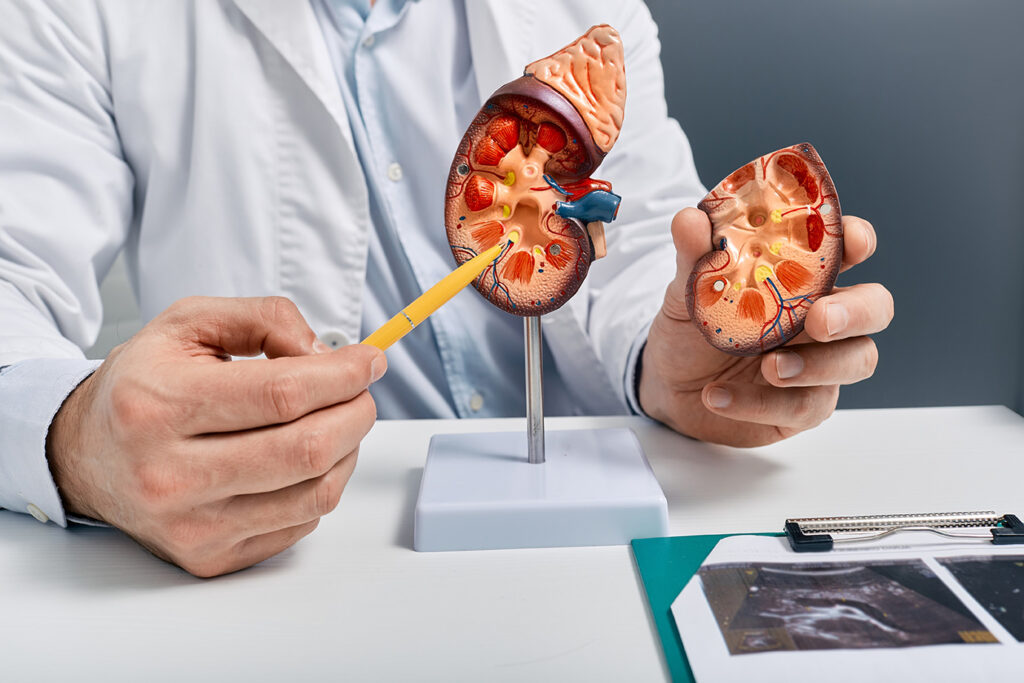Benign prostatic hyperplasia (BPH), or an enlarged prostate, is a common condition affecting millions of men worldwide, particularly those over 60. Living with BPH can significantly impact daily life, especially as the condition worsens.
In this article, we’ll help you understand what BPH is, the connection between BPH and kidney health, its associated risks and complications, and how to protect yourself from an enlarged prostate and kidney issues.
BPH is a non-cancerous enlargement of the prostate gland—a small, walnut-shaped male reproductive organ located between the bladder and penis.
Because your urethra (the tube that carries urine from your bladder to your penis) passes through the middle of your prostate, prostate enlargement may cause one or more BPH symptoms, such as:
An enlarged prostate may also increase your risk for more serious kidney issues.

Men with BPH who have trouble emptying their bladder or extended periods of urinary obstruction have a higher risk of the following urinary tract, bladder, and kidney issues:
As urinary and bladder symptoms become severe, the following kidney problems can occur:
Seek BPH treatment at the first sign of urinary difficulties to stay safe and protect your long-term kidney health. Next, we explore factors that can increase your risk for kidney issues.
If you have one or more of the following health conditions, you have a higher risk of developing kidney issues:
Ask your doctor about ways to lower your risk for BPH and kidney disease. If you ignore the warning signs of BPH puts you at risk for kidney failure.
Kidney failure, or renal failure, is a critical condition that occurs when the kidneys lose their ability to effectively remove waste products from the blood. This leads to a dangerous buildup of toxins in the body, disrupting normal bodily functions and causing illness. While acute kidney failure can often be reversed with proper treatment, chronic kidney failure may require regular dialysis or a kidney transplant to sustain life.
Symptoms of an enlarged prostate and kidney failure may begin slowly but will progress in severity. Warning signs of serious kidney damage include:
Recognizing these warning signs and seeking prompt medical attention can help you prevent further complications and manage the condition effectively.
Depending on the severity of your symptoms, you may be able to treat your BPH with simple diet and lifestyle adjustments. For example, you can help lower your symptom burden by following a diet that’s rich in fiber, fruits, and vegetables and avoiding dietary triggers such as:
Certain supplements for prostate health may also help. Talk to your doctor to find out if prostate supplements are right for you.
Maintain a Regular Bathroom and Exercise Schedule
In some cases, you can reduce the health impact of an enlarged prostate by scheduling regular bathroom breaks and using the restroom as soon as you experience an urge to urinate. Regular exercise and stress management can also help manage BPH symptoms.
However, men whose symptoms are not well controlled through diet and lifestyle changes will need to seek medical treatment to avoid developing serious kidney issues.
Find out how to protect your kidneys and address BPH without surgery at Georgia Prostate Institute.
We can help you determine whether prostate artery embolization (PAE) is right for you. This research-backed treatment provides relief to symptomatic patients whose health or preference prevents them from undergoing invasive surgical procedures.
PAE can also help men improve sexual function while reducing their risk for kidney disease.
Wondering if you’re a candidate for PAE in Georgia? Request a consultation today. During your initial visit, we’ll review your treatment options and help protect your long-term kidney health.

Atlanta
3225 Cumberland Blvd. Southeast, Suite 520
Atlanta, GA 30339
Stockbridge
1035 Southcrest Dr., Suite 220 + 250
Stockbridge, GA 30281
Tucker
1975 Lakeside Pkwy., Suite 300
Tucker, GA 30084
Scheduling
Please contact our dedicated specialists to schedule a consultation today.
2025 Georgia Prostate Institute. All rights reserved. Website Design by Healthcare Success